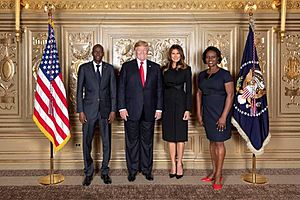Jovenel Moïse facts for kids
Quick facts for kids
Jovenel Moïse
|
|
|---|---|
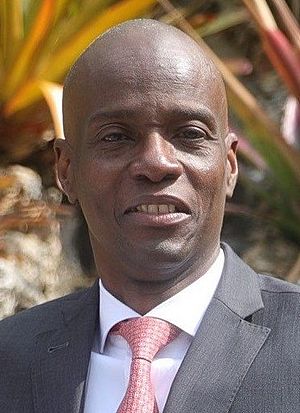
Moïse in 2019
|
|
| 43rd President of Haiti | |
| In office 7 February 2017 – 7 July 2021 |
|
| Preceded by | Jocelerme Privert (interim) |
| Succeeded by | Vacant Claude Joseph (as acting prime minister) |
| Personal details | |
| Born | 26 June 1968 Trou-du-Nord, Nord-Est, Haiti |
| Died | 7 July 2021 (aged 53) Pétion-Ville, Ouest, Haiti |
| Cause of death | Assassination (gunshot wounds) |
| Political party | Tèt Kale |
| Spouse |
Martine Moïse
(m. 1996) |
| Children | 3 |
| Alma mater | Quisqueya University |
Jovenel Moïse (born June 26, 1968 – died July 7, 2021) was a Haitian businessman and politician. He served as the 43rd President of Haiti from 2017 until his death in 2021. He became president in February 2017 after winning the election in November 2016. On July 7, 2021, Moïse was killed during an attack at his home. His wife, Martine Moïse, was also hurt.
Contents
Early Life and Education
Jovenel Moïse was born on June 26, 1968, in Trou-du-Nord, Haiti. His family moved to Port-au-Prince in 1974. There, he went to primary school at École Nationale Don Durélin. He later attended Lycée Toussaint Louverture for secondary school.
In 1996, he married Martine Marie Étienne Joseph, who was his classmate. They decided to leave the capital city that same year. They moved to Port-de-Paix to help develop rural areas. Jovenel and Martine Moïse had three children together.
Business Ventures
Moïse started his business career by creating Jomar Auto Parts. The next year, he began an agriculture project. This project focused on growing organic bananas on a large farm.
In 2001, Moïse worked with Culligan Water. They built a drinking water plant for two departments in Haiti. In 2012, he started a company called Agritrans SA. He also launched an agriculture project called Nourribio. This project helped create Haiti's first agricultural free trade zone. It was a huge banana farm. This farm was meant to export bananas to Germany. This had not happened since 1954. Because of his work with bananas, people nicknamed him Nèg Bannann, which means "Banana Man."
Political Career
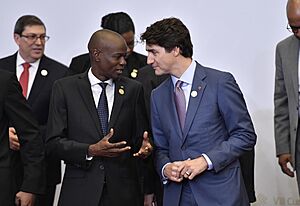
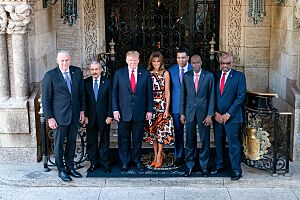
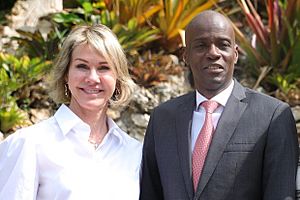
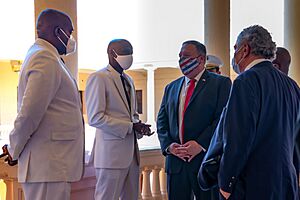
In 2015, President Michel Martelly chose Moïse to be the presidential candidate. He ran for the Haitian Tèt Kale Party (PHTK). During his campaign, Moïse talked about using eco-friendly farming to help Haiti's economy. More than half of Haiti's people live in rural areas. He also supported ideas like education for everyone and health care for all. He wanted to improve energy, create jobs, protect the environment, and develop tourism in Haiti.
In the 2015 election, Moïse received the most votes in the first round. However, there were claims of fraud. Many people protested, and the election results were later canceled. A new election was held in November 2016. This time, Moïse won with over 55% of the votes. He became president without needing a second round of voting. Jovenel Moïse officially became president on February 7, 2017.
There were some disagreements about how long Moïse's term should last. Some people thought his five-year term should end in February 2021. This was five years after the previous president stepped down. However, Moïse believed his term should end in 2022. He counted five years from the day he was sworn into office.
In 2019, Moïse met with U.S. Ambassador Kelly Craft. They discussed ways to solve Haiti's political challenges. Ambassador Craft also met with other political leaders. She encouraged everyone to work together with Moïse.
Presidency
Helping Farmers
President Moïse worked on several projects to help farmers. He built the second-largest hydropower plant and water storage area in Haiti. This plant, called "Barrage Marion," can produce electricity. It also provides water for farmers in northern Haiti. He also rebuilt another water storage area called "Barrage la Tannerie." This helped farmers get more water to grow crops. He built solar-powered water pumping stations for the same reason.
President Moïse also improved the water channel system in the Artibonite department. This made it easier for farmers to grow rice.
Improving Infrastructure
President Moïse built many roads in towns like Jeremie and Port-de-Paix. He also rebuilt and improved the airport in Jérémie. He built power plants to bring electricity to many small towns.
He also built several asphalt plants in different parts of Haiti. These plants helped to repave roads. He rebuilt the town of Les Cayes after it was badly damaged by Hurricane Matthew.
Assassination
On July 7, 2021, Moïse was killed. Gunmen attacked his home in Pétion-Ville around 1 a.m. His wife, Martine Moïse, was injured during the attack. She was flown to a hospital in Miami for treatment. The couple's children were not at home during the attack. The acting Prime Minister, Claude Joseph, said the attack was done by "a group of unknown people." Some of them spoke Spanish.
Honors
In May 2018, President Moïse received an award from the president of Taiwan, Tsai Ing-wen. It was called the Order of Brilliant Jade with Grand Cordon. President Tsai praised Moïse's efforts to improve Haiti's economy.
Images for kids
-
Moïse with Canadian Prime Minister Justin Trudeau in 2018
-
Moïse and other Caribbean leaders with U.S. President Donald Trump in Florida in 2019
-
US Ambassador to the UN Kelly Craft, and President Moïse in 2019
-
U.S. Secretary of State Mike Pompeo and President Moïse in 2020
See Also
 In Spanish: Jovenel Moïse para niños
In Spanish: Jovenel Moïse para niños
 | Stephanie Wilson |
 | Charles Bolden |
 | Ronald McNair |
 | Frederick D. Gregory |


